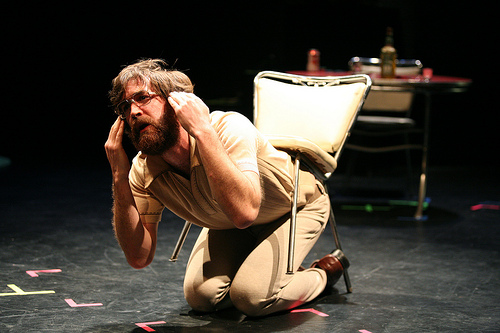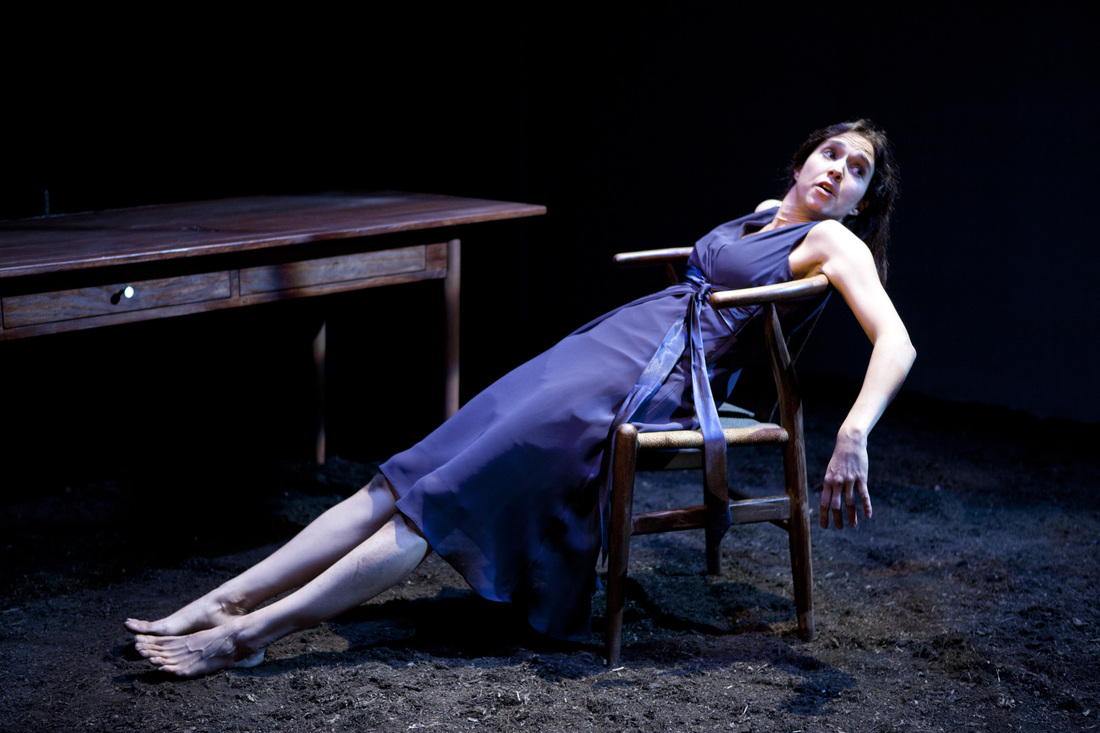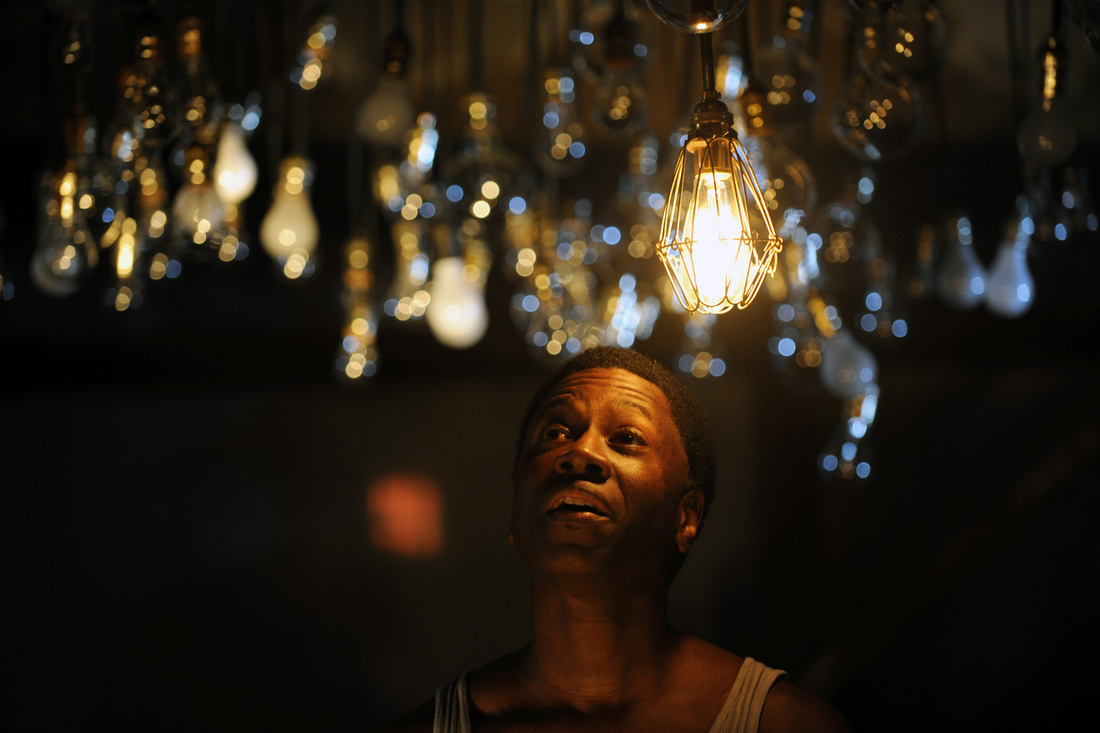|
JACQUELINE LAWTON: Why did you decide to get into theatre? Was there someone or a particular show that inspired you?
ADRIEN-ALICE L. HANSEL: I’ve always been a theatre person. I think I made the transition from actor-on-stage in elementary to high school to a script-as-literature/cultural object in college to oh-my-goodness-I-can-actually-work-on-productions post-college through internships and then grad school and then the professional world. So I was attracted to theatre because I liked being on stage, pretending to be someone else, being a part of something strange and silly and serious. I came back to it in college as something I actually wanted to study because it was one of most consistently engaging ways I found to study the sort of big picture/little picture world of people in society, in their cultural and historical moment. Also, there’s something so literal about theatre that I found appealing when I was considering the best way to work through a liberal arts education—it’s one thing to read about gender as it’s performed. It’s another (and for me, more evocative) thing to stage As You Like It or Peggy Shaw or the most fabulist contemporary writer. We’re wired to understand things about other people. Theatre let me do that. And as a professional…it’s just something I’ve gotten to keep doing. A lot of that has to do with two early mentors of mine: Michael Bigelow Dixon, whom I met during my six-week summer internship in the literary office of Actors Theatre of Louisville. I actually never never never thought I’d find a career in the theatre; it seemed far too capricious a workforce. But Michael asked me hard questions and expected me to know the answers and waited until I figured them out. He helped me realize I could do this work, and that I really liked the work. Christine Sumption was my supervisor at Seattle Repertory Theatre and likewise expected me to be smart and flexible and resilient. She’s also one of the best rounded theatre person I know (she has these things called ‘hobbies’ that I only read about in plays.) JL: How do you define dramaturgy? Or explain to people the work that you do? ALH: I always say that I’m an early audience member for the show, someone who can be exquisitely articulate about my experience, and articulate about the ways that the experience I have of a play differs from the way we as a production team are talking about that play. That I’m rooting for the play as the rest of the creative team envisions it—whether the playwright is involved or not—and that I help articulate whatever gaps between what I understand our goals to be and what I see on stage. JL: How long have you lived and worked as a dramaturg in DC? What brought you here? Why have you stayed? ALH: I’ve been in DC for just over two years—I’d been at Actors Theatre of Louisville for eight seasons, and moved because David Muse had just taken over Studio Theatre, and was interested in starting new play and international programs. I’ve stayed because we haven’t perfected that yet. And because it’s so wonderful to work in a city with a real ecosystem of theatres—differing in size and taste and style. JL: If your work as a dramaturg doesn’t pay the bills, what else do you do? How do you balance this work with your dramaturgy? ALH: I’m the Literary Director at Studio Theatre, so I have a staff position, which makes the bill-paying more centralized. I spend maybe 60% of my time at Studio as a straight-up production dramaturg. The rest of my work here is managerial and administrative—architecting the stream of plays we consider for season planning; working with my kick-ass Associate Lauren Halvorsen on script reading, public programming, and our writing around the season; working with the heads of Communication and Development on the many ways we talk about Studio’s work and its value to the community and the larger field. JL: What skills and traits do you feel a successful dramaturg should have to support the development of a new play or a production? ALH: Smarts, discretion, patience, a sense of satisfaction in being helpful rather than visible (or right), a great sense of humor, the ability to go with the flow and to read people. It’s never bad to have a couple recipes for great baked goods for that time in rehearsal when actors just need to figure things out for themselves. JL: What is the greatest part of being a dramaturg? What has been your most difficult challenge? ALH: I find a lot of great parts of being a dramaturg, and they’re not at all like each other:
JL: Who are your favorite playwrights? What is it about their work that inspires or draws you to them? ALH: So.Many.Writers. I love Rude Mechs for their silliness and sense of danger and delight. Kirk Lynn is their playwright, but they’re a hivemind of strangeness and true loveliness. There are a slew of fabulist Brits whom I just adore, writers who throw themselves into a world beyond our world and show me something unnerving and wonderful about life as we’re living it: Sam Holcroft, Bryony Lavery, Mike Bartlett, Caryl Churchill, Lucy Prebble. And the fabulist Americans, who can twist language and situation and history and hand me a new sense of myself and my country: Naomi Wallace, Suzan-Lori Parks, Lucas Hnath, Marcus Gardley, Mac Wellman, David Adjmi, Jordan Harrison, Anne Washburn, Kyle Schmidt, Heidi Schreck, Adrienne Kennedy, Marco Ramirez, Kirsten Greenidge. And the take-your-breath-away realists from both sides of the Atlantic, who can dissect relationships with impossible grace, who map out the intersections of our social and personal worlds said and unsaid: Amy Herzog, Rachel Bonds, Lydia Diamond, Mike Bartlett, Diana Grisanti, Duncan Macmillan, Marisa Wegrzyn, Nina Raine. There are some dead folks I love too! Euripides for a good dose of crazy, Shakespeare and Beckett for dizzying poetics, Tennessee Williams for an emotional workout. JL: DC audiences are … ALH: Smart, more adventurous than they suspect, and a little more sentimental than they’ll admit. JL: DC actors, designers and directors are... ALH: Creative, true team players, great dressers, and a whole lot of fun to work with. JL: DC playwrights are … ALH: Kind, thoughtful, and truly dedicated to making DC a welcoming place for their fellow writers. It’s inspiring. (They are also a whole lot of fun to hang out with. But that’s maybe true of the playwright community writ large.) JL: DC critics are ... ALH: Interested in excellence, idiosyncratic in their tastes (and thank goodness for all of us theatre-makers), and I think pretty fair-minded. JL: How do you feel the DC theatre community has addressed the issues of race and gender parity? How has this particular issue impacted you and your ability to get your work produced on the main stages? ALH: Well. We’ve far from adequately addressed it to be sure (Another local dramaturg/director, Elissa Goetschius, has dedicated herself to the project of accounting for the percentage of work that’s directed by women). As far as how parity has affected my own work, I’m glad I’m not the only person talking about race and gender (and country of origin, I’d add, since David’s given us a mandate for international work as well) in my institution. At Studio, we talk about parity from the beginning of most of the programming conversations: What is the range of experience we’ve succeeded in representing over the last number of years? What stories have we been producing? What have we left out? And what are we doing about it? These conversations have led us to shift some of our solicitation practices and to the first slate of commissions Studio just announced. That said, these aren’t conversations that feel close to resolved. And once you’ve programmed your season, there’s the designer/director/production staff who you want to make sure feels representative of the full talent pool of artists. JL: What advice do you have for an up and coming DC based dramaturg who has just moved to D.C.? ALH: There’s a lot of theatre here. You should go see it! Figure out who’s making work that you love, work that’s worth your time and heart to jump on into. And then offer to help. Seriously, just ask. Meet people, chat with people, ask people who they know. I don’t hire many dramaturgs—Studio isn’t set up that way—but I will nerd out about plays you love any time I have five minutes to rub together. And there are lots of small theatres who could love to use your brains and enthusiasms. I will say that if you haven’t worked in an institution before, this is a good town to get into a mid-sized theatre where you’ve got a chance of making your voice heard—there are a range of places with different aesthetics and budget sizes, of just-starting upstarts and long-term presences and provocateurs. There’s lots of new work and lots of classical work and lots of never-been-done-here work. People are making work in all kinds of ways here, and hitching your intern wagon to an established organization is one useful way to get a view of the work of institutional theatre and meet a lot of people. (Only if you love the mission of the theatre, and if you trust that the folks you’ll be apprenticing to are taking your personal artistic development seriously. But that’s the subject of a longer advice column.) And then, as anywhere, find your tribe. Make work. Trust your gut and go out on a limb and make interesting mistakes so you can make even more interesting mistakes. JL: What's next for you? Where can we keep up with your work? ALH: I’m not in rehearsal this summer, so I’m getting ready for our community outreach and audience engagement around the 13-14 Season, as well as catching up on all the flabbergasting work around town, seeing some plays out of town, reading plays, and finishing up season two of The Hour (I know, you all watched it last year. I was in rehearsal.) I’ll also be back at the Kennedy Center’s MFA workshop this summer, working with some young smarty-pants writer. And then this summer and fall I’m working Red Speedo by the ridiculously talented Lucas Hnath and director Lila Neugebauer (director of last season’s The Aliens at Studio). It’s a smart, stylish play about brothers and love and sacrifice and doping in sports and American exceptionalism. (Also there’s an actor who’ll be in a speedo for 90 minutes. If that’s your thing.)
3 Comments
Virginia K. Lawson
4/20/2013 03:32:52 am
I can see why you are a success now and how you are growing in depth professionally as well as other ways too. And, as they say, "your family is so proud of you"
Reply
Adrien-Alice Hansel
5/2/2013 10:38:26 am
In case it's not clear, everyone, this is my mother.
Reply
Your comment will be posted after it is approved.
Leave a Reply. |
My BlogI'm a playwright, dramaturg, and teaching artist. It is here where you'll find my queries and musings on life, theater and the world. My posts advocate for diversity, inclusion, and equity in the American Theatre and updates on my own work. Please enjoy!
Categories
All
Archives
June 2020
Reading List
|



